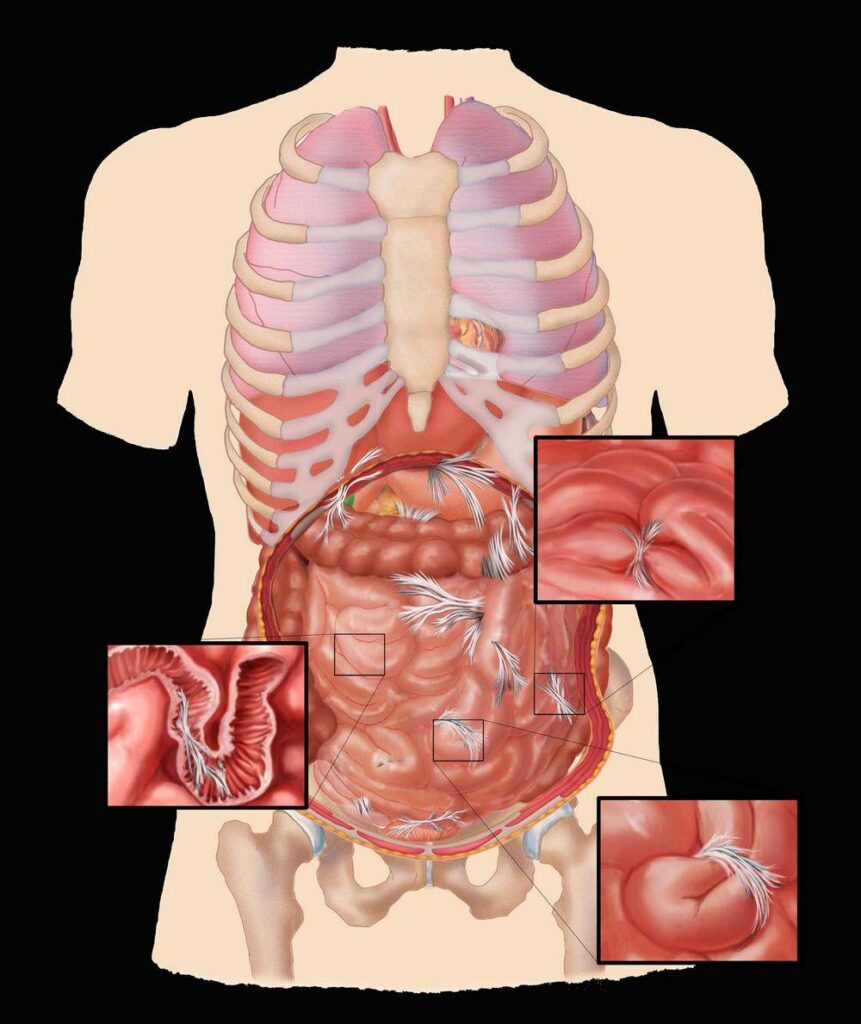
In the realm of medical interventions, surgeries, such as colon resection and C-sections, have become commonplace solutions for various conditions. However, while these procedures often offer immediate relief, it is crucial to understand the potential long-term side effects associated with them. In this informative blog post, we will explore the intricacies of these surgeries, focusing on the aftermath of surgeries while shedding light on the implications of scar tissue and adhesions. Additionally, we will compare conventional surgery approaches with an alternative method, specifically the Clear Passage® Therapy, as a means to address bowel obstructions, blocked tubes, chronic pain, and Crohn’s disease.
Adhesions: A Common Abdominal Surgery Complication
Surgery, while often necessary for various medical conditions, comes with inherent risks that extend beyond the immediate postoperative period. One of the significant complications associated with this type of surgery is the formation of adhesions. Adhesions are fibrous bands of scar tissue that can develop between internal organs and tissues, causing them to stick together. Understanding the risks of adhesions is crucial for patients and healthcare professionals alike.
Adhesions can form after any surgery, including procedures such as colon resection, C-sections, bowel obstructions, gastric bypass, or abdominal trauma. These bands of scar tissue can be thin and filmy or dense and fibrous, and their development is a natural part of the body’s healing process. However, when adhesions become extensive or cause complications, they can lead to serious consequences.
Risks Associated with Adhesions:
1. Chronic Pain:
Adhesions can tether organs together, restricting their normal movement. This can result in chronic pain as the adhesions pull and strain surrounding tissues. Patients may experience persistent discomfort that can significantly impact their quality of life. – read about our chronic pain services here.
2. Bowel Obstruction:
Adhesions are a leading cause of bowel obstructions, a condition where the normal flow of intestinal contents is blocked. As adhesions tighten and constrict the intestines, individuals may experience severe abdominal pain, bloating, nausea, and vomiting. – read about our bowel obstruction services here.
3. Female Reproductive Issues:
Adhesions can affect the female reproductive organs, leading to fertility problems or complications during pregnancy. In cases of scar tissue c-section adhesions may cause the uterus and surrounding tissues to adhere, increasing the risk of difficulties in getting pregnant again or in subsequent pregnancies. – read about our infertility treatment here.
4. Organ Dysfunction:
In severe cases, adhesions can cause organs to become twisted or pulled out of their normal position. This can lead to compromised organ function and, in some instances, necessitate additional surgical interventions to correct the issue.
Read more about our abdominal adhesions service in more detail.
Mitigating Risks:
While the formation of adhesions is a natural response to surgery, efforts can be made to reduce their severity and impact:
1. Minimally Invasive Techniques:
Minimally invasive surgical approaches, such as laparoscopy, can result in fewer adhesions compared to traditional open surgeries. These techniques involve smaller incisions and cause less trauma to surrounding tissues.
2. Barrier Products:
Some surgical interventions use barrier products, such as adhesion barriers, to create a physical barrier between organs and tissues, minimizing the risk of adhesion formation.
Understanding the Long-Term Side Effects of Colon Resection Surgery
- Scar Tissue Formation
American College of Surgeons is continuing research in the formation of adhesions post-surgery. While the immediate benefits of colon resection surgery, c-sections, and discectomies are apparent, the formation of scar tissue, or adhesions, post-surgery can lead to several complications. - Chronic Bowel Issues
As cited by Standford, “The NIH estimates that about 93 percent of these surgeries result in adhesions and that about 20 percent of surgical patients will be re-hospitalized for adhesion-related complications” Long-term side effects of this surgery may include chronic pain, scared fallopian tubes, or chronic bowel issues, such as altered bowel habits, diarrhea, or constipation. These complications can significantly impact an individual’s quality of life.
The Lingering Effects of C-Section: A Closer Look
1. Impact on Future Pregnancies
While C-sections are often necessary for various medical reasons, they are not without consequences. Long-term side effects may include an increased risk of complications in subsequent pregnancies, such as placenta previa or uterine rupture.
2. Adhesions and Pelvic Pain
The formation of adhesions after a C-section can lead to pelvic pain and discomfort. Scar tissue may cause organs to adhere to one another, resulting in chronic pain and potential complications, such as painful intercourse, decreased libido, and decreased orgasm.
Surgical Intervention vs. Clear Passage® Method: A Comparative Analysis
In the realm of abdominal health, the choice between traditional surgical interventions and alternative methods can significantly impact patients’ well-being. One notable alternative is the Clear Passage® method, a non-invasive approach that has garnered attention for its efficacy in addressing issues like bowel obstructions, blocked tubes, chronic pain, and Crohn’s disease. In this comparative analysis, we delve into the strengths of both surgical interventions and the Clear Passage® method, highlighting the research, news coverage, and the remarkable satisfaction of Clear Passage’s clientele over the past 30 years.
Surgical Intervention: The Conventional Approach
Strengths:
- Immediate Resolution: Traditional surgical interventions often provide immediate relief by directly addressing the root cause of the medical issue, such as removing obstructive tissue or repairing damaged organs.
- Established Protocols: Surgical procedures follow well-established protocols with a wealth of scientific literature supporting their effectiveness for specific conditions.
Limitations:
- Adhesion Formation: Despite the benefits, surgical interventions carry the risk of adhesion formation, which can lead to complications such as chronic pain, bowel obstructions, and organ dysfunction.
- Invasive Nature: Surgical procedures are inherently invasive, involving incisions and tissue manipulation, which can contribute to longer recovery times and increased risk of postoperative complications.
Clear Passage® Method: A Non-Invasive Alternative

Clear Passage® offers an all-natural, hands-on approach to decreasing adhesions.
Strengths:
- Non-Surgical Approach: Clear Passage® employs a non-invasive manual therapy approach, focusing on breaking down adhesions and scar tissue without the need for surgery.
- Patient-Centric: The method is patient-centric, aiming to address underlying issues with a holistic approach that considers the individual’s unique circumstances.
Limitations:
- Condition-Specific: While effective for various conditions, the Clear Passage® method may not be suitable for every medical issue, and its applicability depends on the specific diagnosis.
Clear Passage’s Research and Success Stories
Clear Passage® Physical Therapy, with over 30 years of experience, stands as a beacon of success in the realm of non-invasive treatments. Numerous research studies conducted by Clear Passage® provide insights into the effectiveness of their method for addressing a spectrum of conditions.
Research Studies:
A plethora of research studies conducted by Clear Passage® on breaking down adhesions from abdominal surgery increased function after clearing these adhesions, and better quality of life are available on their official website, offering in-depth analyses of the method’s outcomes.
Customer Testimonials:
The heart of Clear Passage’s success lies in the testimonials of over 30 years of satisfied customers. These testimonials showcase real-world experiences, highlighting the positive impact of the Clear Passage® method on individuals’ lives.
Post-Surgical Adhesions: Athlete Finds Relief at Clear Passage® After Trying 15 Other Treatments
“Five days of treatment has done more to release adhesions and restrictions all over my body than the last six years of physical therapy and acupuncture.”
Anna

News Coverage and Recognition
In the News:
Clear Passage’s groundbreaking method has not gone unnoticed by the media. Numerous news articles in reputable magazines and journals have featured the success stories and innovative approach of Clear Passage®, adding to the method’s credibility and recognition.
Conclusion: Making Informed Choices for Long-Term Well-Being
In the landscape of abdominal health, the choice between surgical intervention and alternative methods is a pivotal decision that requires careful consideration. The Clear Passage® method, with its non-invasive approach and decades of success, offers a compelling alternative to traditional surgeries. Research studies, customer testimonials, and media coverage collectively underscore the effectiveness and patient satisfaction associated with Clear Passage®.
In the ever-evolving landscape of healthcare, informed choices pave the way for a healthier and more fulfilling future. The journey towards healing involves not only addressing immediate concerns but also considering the enduring impact of the chosen intervention.
As individuals navigate the complexities of their health, the Clear Passage® method stands as a beacon of hope—a testament to the possibility of addressing abdominal issues without resorting to invasive surgeries. By embracing a patient-centric, non-invasive approach, Clear Passage® opens new avenues for individuals seeking long-term well-being and a higher quality of life.


